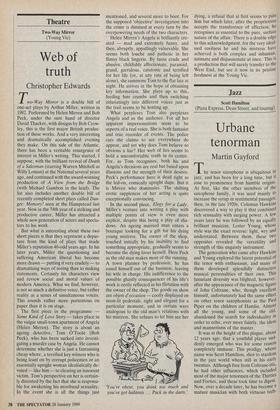Theatre
Two-Way Mirror (Young Vic)
Web of truth
Christopher Edwards
Two-Way Mirror is a double bill of one-act plays by Arthur Miller, written in 1982. Performed by Helen Mirren and Bob Peck, under the sure hand of director David Thacker, with designs by Bob Crow- ley, this is the first major British produc- tion of these works. And a very interesting and dramatically accomplished evening they make. On this side of the Atlantic, there has been a veritable resurgence of interest in Miller's writing. This started, I suppose, with the brilliant revival of Death of a Salesman (starring Warren Mitchell as Willy Loman) at the National several years ago, and continued with the award-winning production of A View from the Bridge (with Michael Gambon in the lead). The list also includes another double bill of recently completed short plays called Dan- ger: Memory! seen at the Hampstead last year. Now in the 74th year of a striking and productive career, Miller has attracted a whole new generation of actors and specta- tors to his work.
But what is interesting about these two short pieces is that they represent a depar- ture from the kind of plays that made Miller's reputation 40-odd years ago. In his later years, Miller the questioning and suffering American liberal has become more drawn — putting it very crudely — to dramatising ways of seeing than to making statements. Certainly his characters view and review social and moral values of modern America. What we find, however, is not so much a definitive voice, but rather reality as a series of simultaneous voices. This sounds rather more portentous on paper than it is on stage.
The first piece in the programme Some Kind of Love Story — takes place in the vulgar small-town apartment of Angela (Helen Mirren). The story is about an ageing detective, Tom O'Toole (Bob Peck), who has been sucked into investi- gating a murder case by Angela. He cannot determine whether she is just a fantasising cheap whore, a terrified key witness who is being leant on by corrupt policemen or an essentially upright woman idealistically de- voted — like him — to clearing an innocent victim. Tom's perspective on her is certain- ly distorted by the fact that she is responsi- ble for awakening his moribund sexuality. In the event she is all the things just
mentioned, and several more to boot. For the supposed 'objective' investigation into the crime is dimmed at every turn by the overpowering needs of the two characters.
Helen Mirren's Angela is brilliantly cre- ated — mad and extremely funny, and then, abruptly, appallingly vulnerable. She seems both louche and pathetic in her flimsy black lingerie. By turns crude and abusive, childishly affectionate, paranoid, grand, garrulous, catatonic and terrified for her life (or, at any rate of being left alone), she summons Tom to the flat late at night. He arrives in the hope of obtaining key information. She plays up to this, feeding him crumbs and then switching infuriatingly into different voices just as the trail seems to be hotting up.
What perplexes Tom also perplexes Angela and us the audience. For all her apparent impersonations seem to be aspects of a real voice. She is both fantasist and true recorder of events. The police cars she claims to see everywhere do appear, and yet why does Tom believe so obvious a liar? Her web of lies seems to hold a uncomfortable truth in its centre. For, as Tom recognises, both his and Angela's decisions are real but based upon illusions and the strength of their desires. Peck's performance here is dead right as the led-on, comically upright dupe. But it is Mirren who dominates. The shifting erotic suppleness of her acting is quite exceptionally convincing.
In the second piece, Elegy for a Lady, Miller's venture into writing a play with multiple points of view is even more explicit, despite this being a play of sha- dows. An ageing married man enters a boutique looking for a gift for his dying young mistress. The owner of the shop, touched initially by his inability to find something appropriate, gradually seems to become the dying lover herself. Here Peck as the old man makes most of the running. A town planner by profession, he has eased himself out of the business, leaving his wife in charge. His indifference to the possible ghastly consequences of his life's work is eerily reflected in his flirtation with the owner of the shop. The goods on show are objets d'occasion — coolly displayed on neon-lit pedestals, right and elegant for a particular moment, and in certain ways analogous to the old man's relations with his mistress. She refuses to let him see her `You're obese, you drink too much and you've got halitosis ... Pack in the darts.' dying, a refusal that at first seems to pain him but which later, after the proprietress accepts the transference of affection, he recognises as essential to the pure, surface nature of the affair. There is a double edge to this acknowledgment, for the very ideal- ised coolness he and his mistress have achieved is both complex and inhuman, intimate and dispassionate at once. This is a production that will surely transfer to the West End, but see it now in its pristine freshness at the Young Vic.

















































 Previous page
Previous page